新概念第二册第2课-一般现在时-现在进行时-感叹句
新概念英语第二册第二课(包含课文、练习及答案)
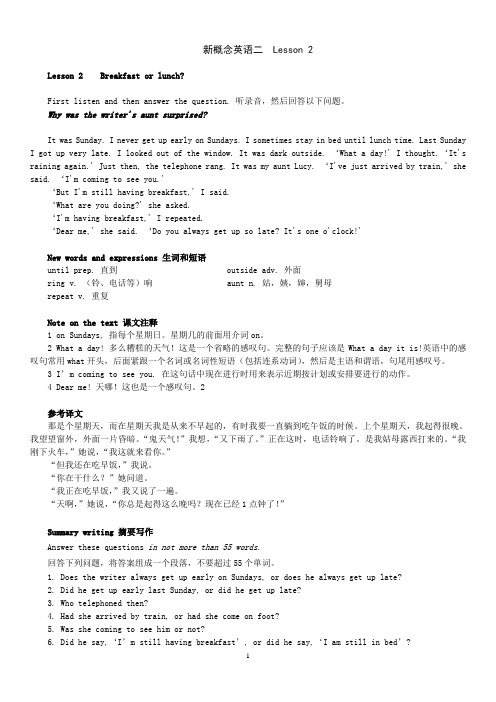
新概念英语二 Lesson 2Lesson 2 Breakfast or lunch?First listen and then answer the question. 听录音,然后回答以下问题。
Why was the writer's aunt surprised?It was Sunday. I never get up early on Sundays. I sometimes stay in bed until lunch time. Last Sunday I got up very late. I looked out of the window. It was dark outside. ‘What a day!' I thought.‘It's raining again.' Just then, the telephone rang. It was my aunt Lucy. ‘I've just arrived by train,' she said. ‘I'm coming to see you.'‘But I'm still having breakfast,' I said.‘What are you doing?' she asked.‘I'm having breakfast,' I repeated.‘Dear me,' she said. ‘Do you always get up so late? It's one o'clock!'New words and expressions 生词和短语until prep. 直到 outside adv. 外面ring v. (铃、电话等)响 aunt n. 姑,姨,婶,舅母repeat v. 重复Note on the text 课文注释1 on Sundays, 指每个星期日。
新概念英语第二册语法详解和总结

新概念英语二册语法详解和总结《新概念英语》(New Concept English)作为享誉全球的最为经典地道的英语教材,以其严密的体系性、严谨的科学性、精湛的实用性、浓郁的趣味性深受英语学习者的青睐,《新概念英语》在中国有 30多年的历史,每年有数百万学习者,早已成为英语学习者的必选读物。
我们抛弃以往只将《新概念英语》作为单一的泛读教材的模式,代之以全新独到的、大信息量的联想式的教学方法,多角度、全方位的教学手段,辅以丰富多彩、新颖实用的补充材料,逐步培养学员听、说、读、写、译等五大基本技能,充分发挥学生的英语学习潜力,使学员经过一定阶段的培训之后,英语水平与基本技能会有一个质的飞跃。
一、学习前的准备《新概念英语第二册》旨在全面训练学生的4项技能、理解、口语、阅读、写作。
使学生具有使用语言的能力。
一般来说,具有以下知识便可进入《新概念英语第二册》的学习:1、动词be与have现在时与过去时的基本用法。
2、现在进行时,能够识别并懂得如何构成。
3、一般现在时:能够识别;懂得动词第3人称单数上添加-s, -es, 或-ies后缀。
4、一般过去时:能够识别并会运用常见的规划动词与不规则动词的一般过去时形态。
5、过去进行时:能够识别。
6、现在完成时(一般):能够识别。
7、过去完成时:能够识别。
8、将来时:能够认识并运用going to, shall与will构成将来时。
9、助动词:can, may与must的基本用法;能够识别could, might与would 的形式。
10、能够用do/does/did等助动词造疑问句与否定句;能运用疑问代词与副词。
11、能够回答以助动词与疑问词开头的问句。
12、副词:能够用-ly与-ily后缀组成副词;能够识别well, hard, fast等特例。
13、冠词:定冠词与不定冠词。
懂得a/an/the的基本用法;some, any, no, much, many, a lot of 接可数、不可数名词的用法。
新概念第二册时态篇

congratulatons for
your progress
单击转到目录页
指示一般现在时的时间短语
1.频度副词: sometimes(有时), often, always(总是), usually(通常), seldom(很少) 2. in the morning/afternoon/evening 3. every day/morning… 4. on Sundays(星期日)…
He often goes to the English corner. 3.表主语具备的性格和能力等:
e.g. She likes noodles. They speak French.
4.普遍真理和自然规律:
e.g. Two plus four is six.
The moon goes around the earth.
❖ A had eaten B ate
❖ C are eating D have eating
❖ 4.Maybe it was because he __A_ to the radio, but he didn’t notice the dark object in the road until it was too late.
❖ A I called
B I’m calling
❖ C I’ve called D I’ll call
❖ 3.—Tony, where are the cookies ? Don’t tell me you_B_ them all! Again!
❖ ---Yes, I did. I couldn’t help it. They were so good.
(完整版)新概念英语第二册第二课(包含课文、练习和答案)
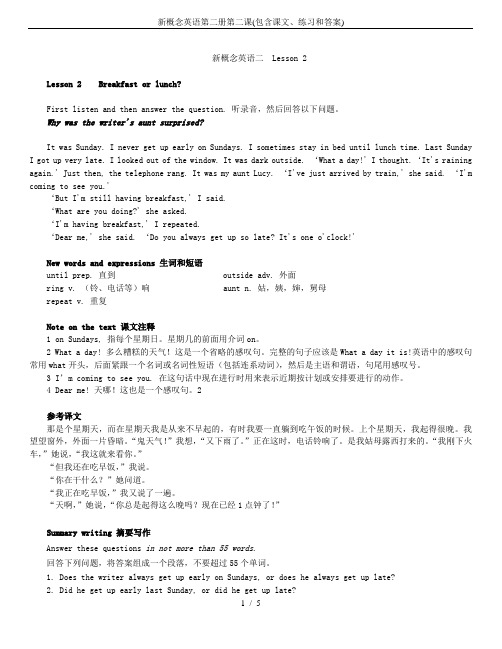
新概念英语二 Lesson 2Lesson 2 Breakfast or lunch?First listen and then answer the question. 听录音,然后回答以下问题。
Why was the writer's aunt surprised?It was Sunday. I never get up early on Sundays. I sometimes stay in bed until lunch time. Last Sunday I got up very late. I looked out of the window. It was dark outside. ‘What a day!' I thought.‘It's raining again.' Just then, the telephone rang. It was my aunt Lucy. ‘I've just arrived by train,' she said. ‘I'm coming to see you.'‘But I'm still having breakfast,' I said.‘What are you doing?' she asked.‘I'm having breakfast,' I repeated.‘Dear me,' she said. ‘Do you always get up so late? It's one o'clock!'New words and expressions 生词和短语until prep. 直到 outside adv. 外面ring v. (铃、电话等)响 aunt n. 姑,姨,婶,舅母repeat v. 重复Note on the text 课文注释1 on Sundays, 指每个星期日。
新概念英语第二册重要句型和语法汇总

Lesson 1简单陈述句的语序1)句子种类:按句子结构分为简单句、并列句、复合句2)句子成分:主语、谓语、宾语、定语、状语、补语、表语3)简单句的基本成分和语序:参考教材第14页的表格和练习一、重要句型或语法Lesson 21、时态复习1)一般现在时,如:I never get up early on Sundays.2)现在进行时,如:I'm still having breakfast.2、感叹句1)由what引导的感叹句,强调名词,如:What a hot day!2)由how引导的感叹句,强调形容词或副词,如:How hot it is today! / How fast he runs!Lesson 31、时态复习一般过去时,表示过去发生的事情,如:The driver of that car hit that post over there.2、双宾动词1)双宾动词是指某些动词后面可以跟两个宾语,表物的为直接宾语,表人的为间接宾语。
2)注意区分双宾动词后间接宾语前用to还是for的区别,一般表示动作对某人而做用to,表示动作为某人而做用for。
如:He passed the salt to me. / She bought the tie for me.Lesson 4时态复习现在完成时,表示过去发生的事情对现在造成的影响或结果,如:I have seen the film.该句可能暗含的潜台词是:我对这部电影的情节比较了解了或者我不愿意再看这部电影了。
1)标志性词语:already/just/yet/never/ever2)常见时间状语:recently/lately;in the past/latest+一段时间;up to now/so far3)have been to(去过已回)与have gone to(去了未回)的区别4)瞬间动词(可用于完成时,但不能与一段时间连用)与持续动词的区别5)since(+具体时间/时间点)与for(+一段时间/时间段)的区别Lesson 51、时态复习1)一般过去时,表示过去发生的动作或状态,如:Yesterday, a pigeon carried the first message from Pinhurst to Silbury. / He was very tired after a whole day's work last night.2)现在完成时,表示过去发生的动作对现在造成的影响或结果,如:He has just bought another garage in Pinhurst. / In this way, he has begun his own private'telephone' service.2、有关way的短语1)in the way,表示挡路了或是按照某种方法/方式,如:The chair is in the way. / Do the job in the way your teacher has shown you.2)on the way,表示在路上,如:On the way home, I bought some cakes for my daughter.3)in this way,表示用这种方法,如:In this way, he has saved more than five thousand dollars.4)by the way,表示顺便说一下,如:By the way, have you seen Tom recently?5)in a way,表示在某种意义上,如:In a way, he is more than a teacher to us.Lesson 61、冠词的用法1)不定冠词a/an,如:a pen, an egg2)定冠词the,如:A dog is barking at me. The dog is black and white.3)零冠词,即不用冠词的情况,如人名和地名前面,如:John lives in London.2、短语动词的用法短语动词指的是后面跟上介词或副词后、意思会发生变化的动词。
(完整版)新概念第二册lesson2

Lesson 2 Breakfast or lunch?【New words and expressions】★until prep.直到until用于表示动作、状态等的持续,可译为“一直到……为止”或“在……以前”。
在肯定句中,它与表示持续性状态的动词连用,表示持续到某一时刻:I’ll wait here until 5. 我会在这里等到5点钟。
在否定句中,它通常与描述短暂动作的动词连用,表示“到……为止”、“直到……才”:She cannot arrive until 6. 她到6点才能来。
His father didn't die until he came back.until(后的从句)的时间终止之前,这个动作做了还是没做?做了前面的主句用肯定;没做用否定For he ___A(C)___(wait) until it stopped raining.A. waitedB. didn't waitA. leaveB. leftC. didn't leave★outside adv. 外面(作状语)He is waiting for me outside.★ring(rang. rung) v.(铃、电话等)响① vt. 鸣,(铃、电话等)响(这种响是刺耳的, 往往是提醒人做某事)Every morning the clock rings at 6.The telephone(door bell) is ringing.而风铃等响要用jingle,jingle (bell) (铃儿) 响叮当② vt. 打电话给(美语中用call)ring sb. 给某人打电话③ n. (打)电话give sb. a ringRemember to give me a ring. /Remember to ring me.④ n. 戒指★aunt n. 姑,姨,婶,舅妈(所有长一辈的女性都用这个称呼)男性则是uncle: 叔叔他们的孩子:cousin 堂兄妹(不分男女)cousin的孩子:nephew 外甥;niece 外甥女★repeat v. 重复① vt. 重复Will you repeat the last word?② vi. 重做,重说Please repeat after me.【课文讲解】1、It was Sunday.it指时间、天气、温度或距离,it被称为“虚主语”(empty subject)。
新概念二册知识点总结

新概念二册知识点总结新概念英语第二册是一本英语学习教材,主要涵盖了一些基础的语法知识和词汇。
以下是该册教材的一些主要知识点总结:1. 时态:第二册主要涉及一般现在时、一般过去时、一般将来时、现在进行时、过去进行时等基本时态。
例如:- I go to school every day.(一般现在时)- She studied hard last night.(一般过去时)- We will visit our grandparents next weekend.(一般将来时)- He is watching TV now.(现在进行时)- They were playing soccer when it started raining.(过去进行时)2. 动词的用法:第二册介绍了一些常见动词的用法,包括及物动词和不及物动词的区别、动词的时态和语态等。
例如:- I like playing basketball.(及物动词)- She sleeps well at night.(不及物动词)- He has finished his homework.(动词的完成时态)- The book was written by Mark Twain.(动词的被动语态)3. 数词和量词:第二册包含了一些基本的数词和量词的用法,如基数词、序数词、分数、百分数等。
例如:- There are twenty students in our class.(基数词)- This is the first time I've been to Beijing.(序数词)- I ate half of the cake.(分数)- 50% of the population lives in urban areas.(百分数)4. 介词和介词短语:第二册介绍了一些常用的介词和介词短语的用法,包括时间、地点、方式等方面。
新概念2语法知识点梳理

新概念2语法知识点梳理在学习英语语法时,掌握关键的知识点是非常重要的。
以下是新概念2英语教材中的一些重要语法知识点的梳理:1. 一般现在时:用于描述常态、习惯性行为或真理。
一般现在时的基本结构是主语+动词原形。
例如:She always drinks coffee in the morning.2. 一般过去时:用于描述在过去发生的动作或状态。
一般过去时的基本结构是主语+动词过去式。
例如:I visited my grandparents last weekend.3. 现在进行时:用于描述当前正在进行的动作。
现在进行时的基本结构是主语+be动词(am, is, are)+动词的ing形式。
例如:They are watching a movie right now.4. 情态动词:如can, could, may, might, must等,用于表示能力、许可、可能性、推测或必要性等含义。
例如:I can swim.5. 疑问句:用于询问信息。
疑问句的基本结构是助动词+主语+动词原形。
例如:Are you hungry?6. 动词的不定式:表示意向、目的或建议。
动词的不定式的基本结构是to+动词原形。
例如:He wants to study abroad.7. 名词性从句:用作名词的从句,可以充当主语、宾语或表语。
例如:Whathe said is true.8. 定语从句:用于修饰一个名词,通常由关系代词who, which, that引导。
例如:The book that I borrowed from the library is very interesting.这些是新概念2教材中的一些重要的语法知识点。
通过学习和掌握这些知识点,你将能够更好地理解和运用英语语法。
记住,在学习语法时,不仅要记住规则,还要多加练习,以帮助巩固所学知识。
祝你学习愉快!。
新概念英语第二册lesson 2
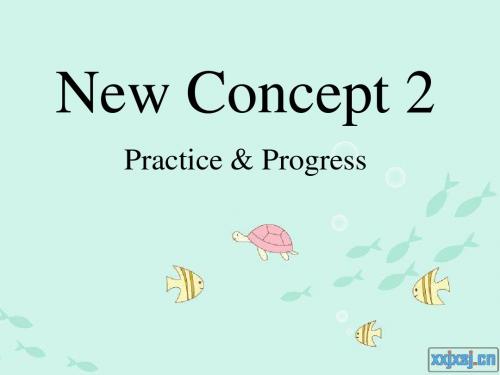
Read loudly :
3.各种时态标志 各种时态标志 一般现在时: 一般现在时:1. on Sundays 2. sometimes 3. never 4. often 5. always 6. usually 7. everyday
3.各种时态标志 各种时态标志 一般过去时: 一般过去时:1. just then 就在那时 2. at that moment 就在那时 3. just now 刚才 4. last … 上个 上个… 5. yesterday 6. ago 以前 7. before
New Concept 2
Practice & Progress
Lesson 2
Breakfast or lunch?
Listening:
Why was the writer’s aunt surprised?
Detail explanation: 1. on Sundays 每一个周日 (现在时态) 现在时态) 2. until 直到 直到…才 常见词组 not… until 直到 才… (主将从现) 主将从现) Eil she comes. It will not grow until it is watered.
3.各种时态标志 各种时态标志 进行时态: 进行时态: 1. now 2. look listen 3. at 8:00 进行时态表示将来 I am coming.=I will come. 我要过来。 我要过来。 = I am leaving. = I will leave. 我要走了
4. 感叹句必背 What a nice girl she is! What good weather it is! How nice she (the girl) is! 5. repeat 重复 repeat sth. to sb. 向某人重复某事 Please repeat what I said to him.
(完整版)新概念第二册各课的语法点归纳
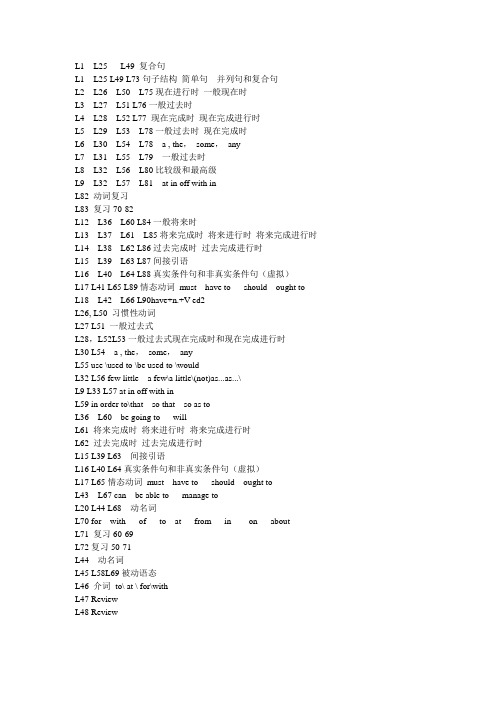
L1 L25 L49 复合句L1 L25 L49 L73句子结构简单句并列句和复合句L2 L26 L50 L75现在进行时一般现在时L3 L27 L51 L76一般过去时L4 L28 L52 L77 现在完成时现在完成进行时L5 L29 L53 L78一般过去时现在完成时L6 L30 L54 L78 a , the,some,anyL7 L31 L55 L79 一般过去时L8 L32 L56 L80比较级和最高级L9 L32 L57 L81 at in off with inL82 动词复习L83 复习70-82L12 L36 L60 L84一般将来时L13 L37 L61 L85将来完成时将来进行时将来完成进行时L14 L38 L62 L86过去完成时过去完成进行时L15 L39 L63 L87间接引语L16 L40 L64 L88真实条件句和非真实条件句(虚拟)L17 L41 L65 L89情态动词must have to should ought toL18 L42 L66 L90have+n.+V-ed2L26, L50 习惯性动词L27 L51 一般过去式L28,L52L53一般过去式现在完成时和现在完成进行时L30 L54 a , the,some,anyL55 use \used to \be used to \wouldL32 L56 few little a few\a little\(not)as...as...\L9 L33 L57 at in off with inL59 in order to\that so that so as toL36 L60 be going to willL61 将来完成时将来进行时将来完成进行时L62 过去完成时过去完成进行时L15 L39 L63 间接引语L16 L40 L64真实条件句和非真实条件句(虚拟)L17 L65情态动词must have to should ought toL43 L67 can be able to manage toL20 L44 L68 动名词L70 for with of to at from in on aboutL71 复习60-69L72复习50-71L44 动名词L45 L58L69被动语态L46 介词to\ at \ for\withL47 ReviewL48 Review。
最新新概念英语第二册第二课经典语法讲解

Noble English诺博英语语法经典讲解Lesson Two Breakfast or Lunch1. It was Sunday. It was my aunt Lucy.在句子中,我们常用it指代时间、天气、温度或距离。
因为它没有实际意义,所以有时被称为“虚主语”;它之所以存在,是因为英语句子必须包含主语和谓语。
请看下面句子中的it分别代表什么:a. It’s 8 o’clock.b. It’s raining again.c. It is cold. d. It was dark outside.作为第三人称的中性词,it 可以指一件东西、一个事件或者用来指是什么人:a. It is a lovely baby. 真是个可爱的小宝宝。
b. ---Who is it? 谁?---It’s me, Zang Jinming. 是我,臧金铭。
2. I never get up early on Sundays.注意,没有说明是具体哪一天,泛指的morning, afternoon ,evening 前面的介词用in ,而涉及到具体的某一天,其介词要用on。
During the winter holidays, Wang Jiawen usually did her homework in the morning and surfed the Internet in the afternoon.课文中,sunday后面加上s, 表示每个星期天,或大部分星期天,与一般现在时连用,表示经常性的行为。
例如:I learn English on Sundays.I learn English on Sunday mornings.但是,当我们使用last, next, this 和that时,那些介词(以及定冠词)就要省去:Last Sunday I got up very late. 上个星期天我起得很晚。
新概念第二册各课的文法重点整理
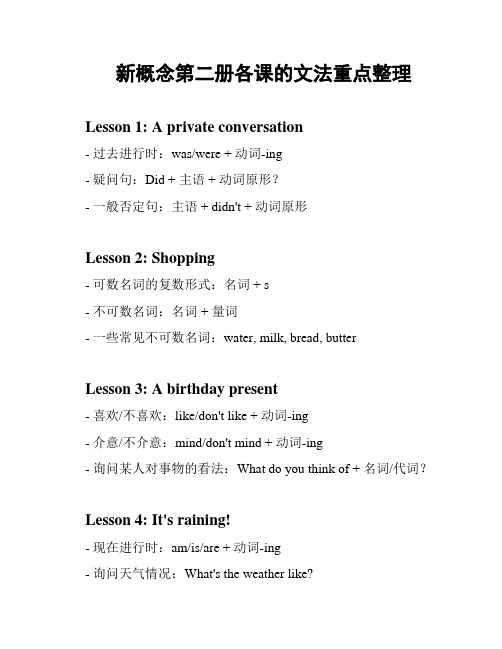
新概念第二册各课的文法重点整理Lesson 1: A private conversation- 过去进行时:was/were + 动词-ing- 疑问句:Did + 主语 + 动词原形?- 一般否定句:主语 + didn't + 动词原形Lesson 2: Shopping- 可数名词的复数形式:名词 + s- 不可数名词:名词 + 量词- 一些常见不可数名词:water, milk, bread, butterLesson 3: A birthday present- 喜欢/不喜欢:like/don't like + 动词-ing- 介意/不介意:mind/don't mind + 动词-ing- 询问某人对事物的看法:What do you think of + 名词/代词?Lesson 4: It's raining!- 现在进行时:am/is/are + 动词-ing- 询问天气情况:What's the weather like?Lesson 5: A thief in the museum- 一般现在时:主语 + 动词原形- 常用动词:look, see, watch, hearLesson 6: What's in a name?- 询问事物的数量:How many + 可数名词 + 动词原形?- 询问事物的颜色:What color + 可数名词 + 动词原形?Lesson 7: Nurse!- 一般过去时:主语 + 动词过去式- 一些常见动词过去式:tell - told, hear - heard, see - sawLesson 8: An exciting trip- 介词短语:in, on, at + 时间- 询问行程:Where are you going + 时间?Lesson 9: A pleasant dream- 情态动词:can, may, must- 询问允许/禁止:Can/May I + 动词原形?Lesson 10:The Picnic- 形容词的比较级:形容词 + er- 询问喜好:Would you like + 可数名词/不可数名词?Lesson 11: Gloves- 指示代词:this, that, these, those- 询问价格:How much is + 名词?Lesson 12: Good news- have to / has to:不得不- 比较级的否定形式:not + 比较级 + thanLesson 13: A cup of tea- 动词不定式:to + 动词原形- 询问意愿:Would you like + to + 动词原形?Lesson 14: My new job- 介词短语:of, with, for + 宾语- 询问位置:Where is/are + 宾语?Lesson 15: An invitation- 一般将来时:will + 动词原形- 询问计划:What are you going to + 动词原形?Lesson 16: No parking- 动名词:动词原形 + ing- 询问权利/义务:Can/May I + 动词原形?Lesson 17: A night out- 过去进行时的疑问句:Was/Were + 主语 + 动词-ing?- 询问活动:What + 动词原形 + 时间?Lesson 18: The new office- 替代动词:do, does, did- 询问替代动词:Do/Does/Did + 主语 + 动词原形?Lesson 19: Uncle Bob- 一般将来时的否定形式:will not + 动词原形- 询问某人对某事有无经验:Have you ever + 动词过去分词?Lesson 20: A career in journalism- 反意疑问句:陈述句 + 否定词 + 陈述句的助动词 + 主语?- 询问工作内容:What do you do + 动词原形?以上是新概念第二册各课的文法重点整理。
新概念2语法分布表

L67
manage to do ; until的用法;不疋式做兵语
L68
非谓语动名词2
L69
现在分词被动完成时作状语
L70
形容词搭配介词(可结合L32、L46)
L71
定语从句复习
L72
动词不定式to do作定语和形容词状语
L73
非谓语动名词3:动名词带逻辑主语;状语从
L83
状语从句总复习
L84
形式宾语的用法
L85
动词不疋式做结果状语too…to表示否疋与结
果状语从句转化
L86
and but so yet or both…a nd either…or
neither…nor not only…but also主谓一致
L87
虚拟语气:用在宾语从句中
L88
虚拟语气3:if从句综合
L89
虚拟语气:情态动词have do ne
L90
主谓一致
L91
分词作宾语补足语
L92
动名词主动表示被动
L93
非限制性定语从句
L94
动词不定式做宾语补足语
L95
动名词与动词不疋式做兵语的含义不冋
L96
for表示因为
将来完成时
L38
过去完成时复习(可结合L14) “一…就…”
句型
L39
直接引语/间接引语2 (可结合L15/L24)
L40
虚拟语气1:if从句对于现在的虚拟
L41
musthave toneed的用法
L42
have的用法have a walk=walk ;状语从句3:
时间状语从句as、as soon as、when
新概念英语 第二册 Lesson 2

共读一本书《新概念英语》lesson 2Lesson 2 Breakfast or Lunch?一阅读课文课文内容:Why was the writer’s aunt surprise d?It was Sunday. I never get up early on Sundays. I sometime s stay in bed until lunchtime. Last Sunday, I got up very late.I looked out of the window. It was dark outsi de. ‘What a day!’ I though t. ‘It’s raining again.’ Just then, the telephone rang. It was my aunt Lucy. ‘I've just arri ved by train,’she said. ‘I'm coming to see you.’‘But I'm still havi ng breakfast,’ I said.‘What are you doing?’ She asked.‘I'm having breakfast,’ I repeated.‘Dear me,’ She said. "Do you always g et up so late? It's one o'clock!’1 ring v. (rang,rung)(1)(铃、电话等)响The telephone / door bell is ringing.电话铃/门铃响了。
(2)给……打电话He ran g me at m y mother's.他打电话到我妈妈家找我。
2 repeat v.重复;重说You have to repe at the cl ass.你必须重修这门课。
- 1、下载文档前请自行甄别文档内容的完整性,平台不提供额外的编辑、内容补充、找答案等附加服务。
- 2、"仅部分预览"的文档,不可在线预览部分如存在完整性等问题,可反馈申请退款(可完整预览的文档不适用该条件!)。
- 3、如文档侵犯您的权益,请联系客服反馈,我们会尽快为您处理(人工客服工作时间:9:00-18:30)。
新概念第二册第2课-一般现在时-现在进行时-感叹句Lesson 2 Breakfast or lunch?单词until 1 prep.直到…时候till直到(多用于口语)eg. I sometimes stay in bed until lunchtime.The street is full of cars from morning till/to night. 从早到晚2 conj eg. 直到…时候(后面加句子)连词eg. I stayed in bed until he woke me up . 直到他把我叫醒我一直躺在床上。
I didn’t get up until he woke me up. 直到他把我叫醒我才起床。
until 语句中动词为延续性动词直到…not...until 主句中动词为非延续性动词直到才…eg. I will wait for you until you come back.I won’t leave until you come back. We stayed until the rain stopped.We didn’t start until the rainstopped.outside n./adj./adv./prep.Inside n./adj./adv./prep. 反义词1 n.the outside of the house2 adj.an outside toilet 户外的厕所outside help 外来的帮助3 adv.eg. It was dark outside. 修饰地占的副词主系表结构Please wait outside.Don’t go outside , because it’s too cold4 prep.eg. It’s outside my business. 这不关我的事。
(在我的职责之外)ring 1 n. 环状物,(尤指)戒指、a wedding ringa diamond ringa gold ringdark rings around her eyes 黑眼圈ring-road环状公路ring finger / the third finger 无名指 thumb 大拇指index finger / the first finger / pointer食指middle finger / the second finger 中指little finger / pinkiehave a ring on the middle finger( engaged 已订婚的) [ɪnˈgeɪdʒd]have a ring on the third finger( married 已婚的)2 v. (铃,电话等)响ring-rang- rung eg. The door bell rang just now.I rang the bell.Will you answer the phone when it rings?ring 3 v. (Am. Call ) 打电话ring sb (up)call sb (up)phone sbtelephone sbgive sb a phone calleg. I’ll ring you later.ring off : put down the receiver ; hang offeg. He rang off before I could explain. 我还没解释呢他就挂断电话了。
aunt n. 姑,姨,婶,舅母uncle 叔叔,舅舅,姨夫,姑父nephew 侄子,外甥niece 侄女,外甥女cousin 堂(表)兄弟姐妹a country cousin (贬)乡下人,乡巴佬repeat v. (say or write again,more than once)重复说,或写某事物,反复重申eg. “I’m having breakfast.”I repeated.I repeated the question several times. Am I repeating myself ? 我以前说过这件事吗?repetition n. 重得,反复,重说,重写[ˌrepəˈtɪʃn]learn by repetition通过反复学习Key structures ----- 一般现在时1. 构成:谓语动词使用动词原形;系动词为 am, is, are的形式。
当主语是第三人称单数时,谓语动词需有变化:1)直接加“s”gives takes asks2)以辅音字母加“y”结尾的动词,变“y”为“i”,再加“es”carry -- carries3)以“o, s, x,ch, sh ”结尾的动词加“es”goes dresses watches brushes2.功能1)表达习惯性,规律性的动作eg. I never get up early on sundays.I sometimes stay in bed untillunch time.2)表达现在的事实状态或动作eg. We all like football.Birds fly. 鸟会飞。
This picture is of great value. 这幅画具有及大的价值。
3)表达客观真理,格言警句或事实eg. The earth moves round the sun. The sun rises in the east and sets in the west.Two and two makes four.Seeing is believing. 眼见为实(格言警句)3. 经常搭配的副词(放在实义动词之前,助动词之后)often sometimes usually always every year seldom occasionally frequentlyeg. He doesn’t always come by train.Do you ever read in bed?I never like jazz..He rarely gets up before 10 o’clock.We frequently have lunch at this restaurant. = often现在进行时1.构成 : am / is / are / + doing2.功能1)表示现在,目前正在做某事,正在进行的动作eg. It is raining.We are enjoying our lunch. 正在享受2)表示现阶段正在进行的动作eg. We are studying English this summer.He is taking physics this semester. 这一学期他正在学物理。
[ˈfɪzɪks] [s ɪˈmestə(r)]3.可用进行时态来表示即将开始的动作go come leave arrive land meet die start return joineg. I am coming to see you. …就来…The bus is coming. …就要来了。
The plane is leaving for Shanghai. …就要飞往…The old man is very ill and he is dying. …就要死了。
4. 有些副词用在进行时中间,表示说话人带有感情色彩,如赞赏,厌恶等。
always forever continually constantly [kən'tɪnjʊəlɪ] 不停地[ˈkɒnstəntli]不断地eg. He is always lying. 他总是在说谎。
You are constantly complaining. 你总是在抱怨。
The girl is always thinking of others. 这个女孩总是考虑别人。
The naughty boy is continually making noise. [ˈnɔ:ti] adj. 淘气的孩子制造噪音5. 下列表示状态,感觉,情绪,精神活动的动词不用于进行时态(用一般现在时)believe doubt see hear know understand belong tothink consider feellook seem show mindhave sound taste require possess care likehate love detest desire[daʊt] v. 怀疑 [kənˈsɪdə(r)]考虑[dɪˈtest] 厌恶 [dɪˈzaɪə(r)] 渴望[rɪˈkwaɪə(r)]要求6. 常搭配的副词now at present at this timethese days现在;现在;此刻,眼前;这段时间rule n. 规距[ru:l]heating n. 暖气[ˈhi:tɪŋ]landlord 房东landlady 女房东TextIt was Sunday. 过去式译为:那是个星期天。
on sundays 每逢星期天(一般现在时)never 从未,未曾,永不eg. I hae never been abroad . 我从未出过国。
Would you do that ? 你会做那件事情吗? ____ Never. 绝不会做的。
I never get up before 10 o’clock in mornings. …在早晨。
never也可用来鼓励对方eg. Never fear. 别害怕。
Never give up . 永不放弃。
Never say die. 永不言败。
Never lose heart. 决不不要灰心丧气。
early adj. adv.an early morningeg. The early bird catches the worm. 捷足先登I got up early this morning. stay in bed 躺在床上stay at home 呆在家里sometimes 有时候some times 几次;几倍some time 一段时间sometime 将来或过去的某个时候eg. I will be somebody sometime in the future. 总有一天我将是个大人物。
get up 起床go to bed 去睡觉fall asleep = go to sleep 睡着了late adj ./ adv.eg. I’m sorry for being late. adj. being (系)late作being的表语I got up very late.adv. Adv.stay up late熬夜,醒着,不去睡lately : recently 最近eg. Have you been abroad lately ? 你最近出过国吗?I bought a new car lately.lately通常用在现在完成时和一般过去时中look out of ... 向…外看look into ... 1 向…里看 2 调查eg. The police are looking into the case. Look out . 小心,当心。
